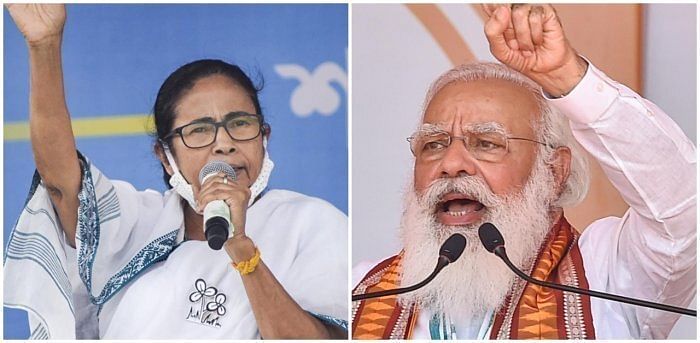
West Bengal Chief Secretary Alapan Bandyopadhyay was on Monday issued show cause notice by the Centre for not reporting for duty in the national capital hours before Chief Minister Mamata Banerjee surprised her opponents announcing his retirement from the service and appointing him as her advisor.
As the battle of attrition intensified over his "unilateral" transfer, sources said the Department of Personnel and Training (DoPT) issued the notice to the 1987-batch West Bengal cadre IAS officer as he showed no intent to join duty in Delhi at 10 am on Monday.
The move to issue show cause notice came hours after Mamata shot off a letter to Prime Minister Modi refusing to relieve Bandyopadhyay, who was to retire on Monday but was given a three-month extension on May 24 on a request by the West Bengal government.
Bandyopadhyay did not fly to Delhi but conducted his official duties at the Secretariat in Kolkata, as the State did not relieve him from his duties.
Sources said the extension for Bandyopadhyay was based on the Bengal government's specific request for his service as Chief Secretary. With the withdrawal of the request and appointment of a new Chief Secretary, they claimed, the Centre's order extending his services also stood nullified.
Soon after the show cause notice was issued, Mamata surprised the Centre by announcing Bandyopadhyay's retirement on Monday itself and his new assignment while attempting to counter action against him.
This is not the first time that Bandyopadhyay is on the line of fire as he and Director General of Police Virendra had not appeared before the Ministry of Home Affairs in December last year following summons from the Centre to explain the law and order situation in the state after BJP president JP Nadda's convoy was attacked.
The latest episode is also a re-run of the chain of events post the attack on Nadda's convoy when the West Bengal government refused to repatriate three IPS officers -- Bholanath Pandey, Praveen Tripathi and Rajeev Mishra -- to the Centre after the incident despite repeated reminders. These officers were part of the security detail of Nadda when he visited Bengal as part of a political campaign and stayed in the state even after the directions from the Mamata govt.
Bandyopadhyay was transferred last Friday to Delhi after he did not attend a meeting by Modi on cyclone relief measures in Bengal, which was also not attended by Mamata.
With the 1987-batch Bengal cadre officer continuing to put up in Bengal and Chief Minister Mamata Banerjee writing to Modi refusing to relieve him, another confrontation is brewing.
The issue is going to snowball into another battle with Mamata herself questioning the transfer without prior consultation with the State.
The Section 6(1) of The Indian Administrative Service (Cadre) Rules 1954 stipulates that the Centre can bring an officer on deputation with the "concurrence" of the state government.
In case of any disagreement, it says that the matter shall be decided by the Centre and the state government shall give effect to the decision of the central government. Banerjee argues that there was no prior consultation about Bandyopadhyay's deputation and the Centre took a "unilateral" decision.
Former bureaucrats pointed out that officers are not usually sent on deputation against their will, though the Centre has the authority to do so. Also on taking action against Bandyopadhyay, they said that the rules are in a grey area.
According to Section 7 of The All India Services (Discipline and Appeal) Rules 1969, it is the state government which has the "authority to institute proceedings and to impose penalty" on officers "if he is serving in connection with the affairs of that State, or is deputed for service in any company, association or body of individuals, whether incorporated or not, which is wholly or substantially owned or controlled by the Government of that state or in a local authority set up by an Act of the Legislature of that State".
